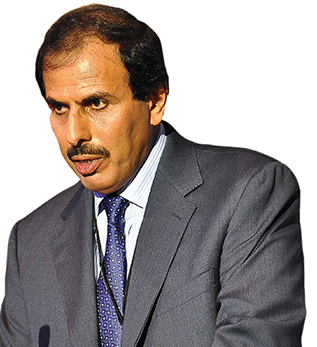As the governor of Qatar Central Bank (QCB), Sheikh Abdulla Bin Saoud Al-Thani is intricately involved in efforts to maintain a strong and expanding banking sector. At the same time, he has an important role in dealing with the economic challenges Qatar faces – whether that is low global oil prices, the need to finance large-scale infrastructure projects or further the diversification of the country's economy.
“The year 2016 was characterised by a challenging global environment and persistence of oil prices at low levels,” says Mr Al-Thani. “Despite these challenges, Qatar has been able to sustain positive and significant growth, reinforced by its emphasis on infrastructural development and the diversification strategy.”
Mr Al-Thani believes that with the increased contribution from the non-hydrocarbon sector, as the country increasingly diversifies its economy, and added output from the Barzan gas project, overall growth in the economy is likely to improve. “The latest International Monetary Fund report has expressed the same view,” he adds.
Asset and profit growth
The Qatari banking sector has remained largely resilient to the economic challenges caused by the drop in global oil prices, supported by sufficient capital buffers and low loan delinquency rates.
“In 2016, the sector recorded healthy asset growth, bolstered by credit demand from the public sector, even though credit to the private sector was lacklustre,” says Mr Al-Thani, who adds that profitability levels were also comfortable, bearing in mind the turbulent global economic environment.
“Adequate management of administrative costs have kept cost-to-income ratios in check. Full implementation of Basel III capital requirements, well-defined capital standards for domestic systemically important banks and the guidance on the application of the Internal Capital Adequacy Assessment Process is expected to further improve the capital buffers to support a healthy asset growth. All these measures are making the banks stronger and resilient,” he says.
According to Mr Al-Thani, non-performing loans (NPLs) have also declined over the past year, which can be attributed to the prudence in lending followed by the banks. “Though not a concern, the QCB as well as all the banks continue to monitor the trends in NPLs very closely,” he says.
Inflation unaffected
Though Standard & Poor’s revised its outlook on Qatar’s long-term sovereign credit ratings to 'negative' from 'stable', due to concerns about the rapid growth in external debt, Mr Al-Thani says the country’s external debt to gross domestic product ratio is about one-fifth, which compares favourably with global peers. Meanwhile, S&P has affirmed Qatar’s AA long-term and A-1+ short-term ratings.
While there was a concern that governmental policy over the past year or so aimed at curbing spending – including cuts in fuel subsidies – would raise inflation, Mr Al-Thani stresses that the effect has been minimal.
“It was generally expected that with subsidy cuts for domestic energy prices, inflation might increase significantly. However, the rise in transportation costs, recreation and education was somewhat offset by a fall in food prices,” he says.
He adds that inflation remained moderate at about 1.8% in December 2016. “We expect inflation to remain benign during the current year,” says Mr Al-Thani.
Infrastructure opportunities
Going forward, Mr Al-Thani sees ample opportunities for the Qatari banking sector, linked to the continued credit demand for financing infrastructure projects linked to the FIFA 2022 World Cup, especially as they pick up pace in the final years before the tournament. However, he says vigilance is needed to moderate any risk to the loan books of banks.
“The demand for credit, both from the public as well as private sectors, is likely to increase. To support this increase in credit demand while ensuring a sustainable balance sheet expansion, the banking sector would need to diversify its sources of finance,” he says. “The capital ratios of banks provide them with ample headroom to finance this growth, while ensuring that their balance sheets are not unduly stretched.”
Mr Al-Thani also sees a greater role to play for the debt market, in enabling an efficient and more judicious allocation of capital.
“It will also shift our economy from a predominantly bank-based system to one where the relevance of non-bank finance also increases,” he says, adding that through the issuance of government bonds and sukuk they can focus on the development of risk-free yield curves to provide an effective benchmark for other debt products.
“We will keep a close watch on the evolving market conditions, including the fiscal position of the government, and accordingly, take a view on the timing and quantum of bond and sukuk issuance,” he says.












